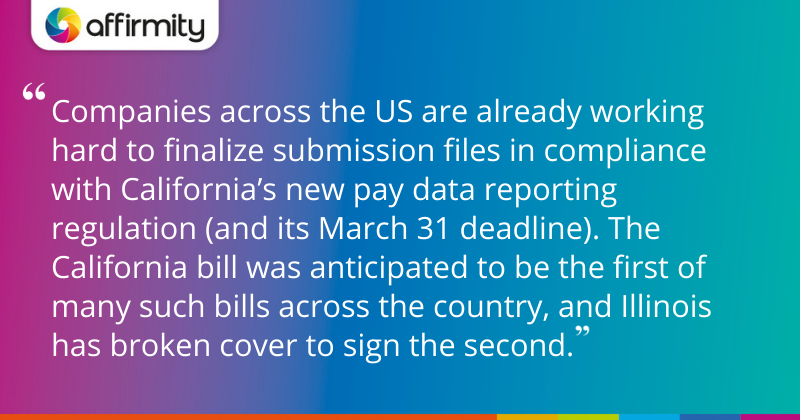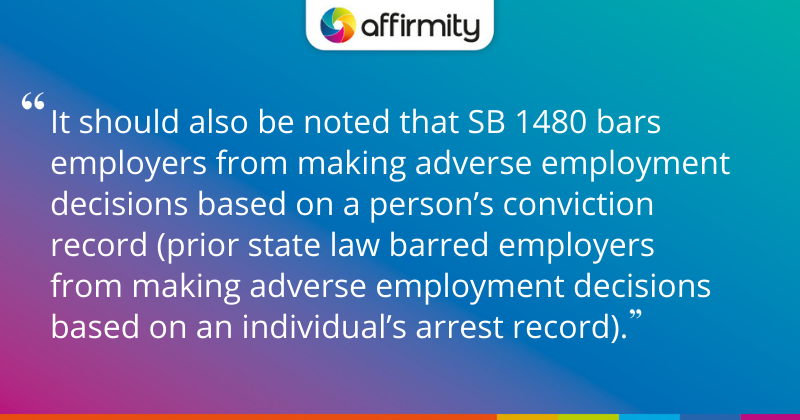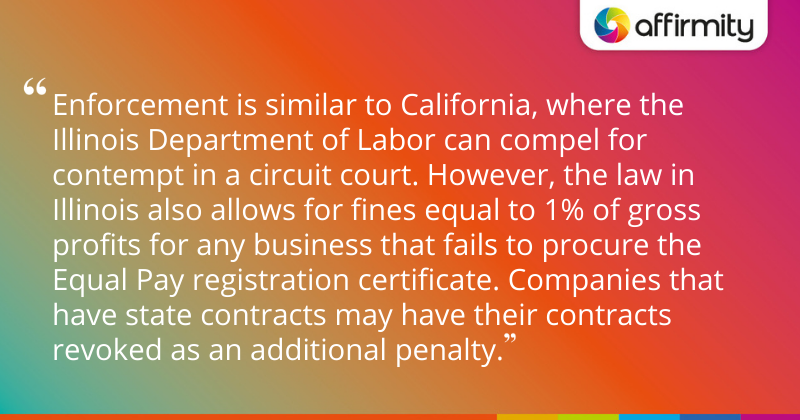Illinois has become the second state to pass legislation requiring employers to report pay data. Find out how Illinois’ new Senate Bill 1480 applies to your organization and how you can prepare for compliance.
Companies across the US are already working hard to finalize submission files in compliance with California’s new pay data reporting regulation (and its March 31 deadline). The California bill was anticipated to be the first of many such bills across the country, and Illinois has broken cover to sign the second.
Senate Bill 1480 was signed into effect by Illinois Governor J.B. Pritzker on March 23, 2021 as an amendment to the Illinois Equal Pay Act of 2004. Key components of the regulation include:
- Beginning March 23, 2024, private employers with over 100 employees in Illinois must certify compliance with the Equal Pay Act by obtaining an Equal Pay registration certificate from the Illinois State Department of Labor.
- In order to obtain a certificate, businesses:
- Must pay a $150 filing fee and submit a statement of compliance to the Department of Labor
- Must also include a copy of their most recent federal EEO-1 filing if they are usually required to file a federal EEO-1 report
- Should submit a list of all employees in the prior calendar year categorized by gender, race, and ethnicity, with their associated wages paid over that timeframe
- The first report must be filed with the company’s first annual report filed on or after January 1, 2023.

MAKE YOUR PAY REPORTING GO FURTHER | ‘How to Connect Your Pay Reporting Requirements to Your Pay Equity Efforts’
How to Obtain Equal Pay Registration Certification in Illinois
When applying for certification, the full list of requirements includes:
- An explanation of how frequently the business reviews its compensation and benefits for disparities among protected and non-protected classes, and how it certifies disparities are corrected when identified
- Evidence that the average compensation for female and minority employees is not substantially below the average compensation for male and non-minority employees (Note: at this time, there is no definition of “substantially below”)
- An outline of the system used to determine employee compensation—such as market pricing, state wage requirements, a performance pay system, or other alternative measures
- Confirmation that the business does not restrict certain genders to specific roles and makes retention and promotion decisions without regard to sex
- A statement signed by an officer, legal counsel, or authorized agent that the company is in compliance with:
- Title VII of the Civil Rights Act
- Equal Pay Act of 1963
- Illinois Human Rights Act
- Equal Wage Act
- Equal Pay Act of 2003
Note: at this time there is not specific guidance on how “compliance” is defined, so employers should continue to refer to the Department of Labor for additional information.

Companies are required to obtain a certificate every two years after receiving their initial certificate. New businesses that meet the 100 employee requirement must be certified within three years of beginning operations.
It should also be noted that SB 1480 bars employers from making adverse employment decisions based on a person’s conviction record (prior state law barred employers from making adverse employment decisions based on an individual’s arrest record).
MORE ON PAY EQUITY | ‘The 5-Step Plan To Embed Fair Pay Practices In Your Organization’
How Will SB 1480 Be Enforced?
Enforcement is similar to California, where the Illinois Department of Labor can compel for contempt in a circuit court. However, the law in Illinois also allows for fines equal to 1% of gross profits for any business that fails to procure the Equal Pay registration certificate. Companies that have state contracts may have their contracts revoked as an additional penalty.
The Department of Labor will not deny issuance of a certificate unless required information is not listed in an application. However, a certificate can be revoked if the Department of Labor determines a business has not made good faith attempts to comply with, or has multiple violations of, Title VII, the Equal Pay Act of 1963, the Illinois Human Rights Act, the Equal Wage Act, or the Equal Pay Act of 2003.
If a company is at risk of not receiving a certificate for non-compliance, the Department of Labor may interview or take depositions from witnesses and may issue subpoenas for the production of all relevant documents or records.

Another significant way that the Illinois law differs from California, and even the federal EEO-1 is that the data will be made publicly available 90 days after it is submitted.
DATA IDEAS FROM THE BLOG | ‘Do You Know Your Diversity Numbers? The Value of Intersectionality, Benchmarking, and Beyond’
Highlights and Next Steps
There are several actions organizations with employees in Illinois should consider taking now, even though the new law does not take effect immediately:
- It would be prudent to review and update policies and procedures in regards to basing employment decisions based on criminal convictions.
- It is critical to understand and audit pay practices to ensure they are in line with the requirements to obtain an equal pay certificate.
- Periodically check the Illinois Department of Labor’s website for additional information.
Affirmity will continue to actively monitor this new requirement and provide you with updates when more information becomes available.
Want to get ahead of the pay reporting law trend and explore the possibilities of a full pay equity analysis with our dedicated, PhD-level workforce analytics team? Contact us today.
 About the Author
About the Author
Allen Appleby oversees product management at Affirmity with direct responsibility for establishing product vision, strategy, and roadmaps. He’s a seasoned product management leader who brings 20+ years of experience across multiple industries. He helps clients achieve positive business outcomes by ensuring Affirmity’s products deliver value across their affirmative action, EEO, and diversity and inclusion needs. Allen holds a Bachelor of Science in Business, an MBA in Marketing, and is Pragmatic Marketing certified.
